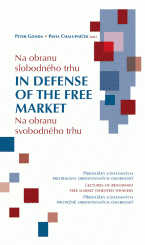 |
|||||||
| INSTITUTE | CONSERVATISM | M.R.STEFANIK |
| CONSERVATIVE LETTERS
|
[22.08.2008, José Piñera, CONSERVATIVE LETTERS]
The worldwide pension crisis has created a great opportunity to empower workers with capital without resorting to expropriations or violent revolutions. In most countries, workers were already compelled to pay between 10 and 30 percent of their wages to state-run retirement systems. The transformation of those payroll taxes into contributions to a personal retirement account that is fully owned by the worker can bring about a new paradigm, a world of worker-capitalists. Karl Marx was right when he asserted that if workers could only sell their labour in the market, many of them would feel alienated from society. But he was terribly wrong in believing that collective ownership of property would give workers a sense of security and control over their lives. Liberating workers requires giving them access to individual ownership of capital in the context of a free market economy. That was my guiding vision when in 1980, as Minister of Labor and Social Security of Chile, I led the effort to replace the state-run, pay-as-you-go, system with one of personal retirement accounts. After 28 years of successful operation, that revolution has not only increased retirement benefits, but changed the face of Chile. Today the private pension system has 8 million participants and manages US$ 110 billions (80% of GNP). Those resources have helped finance almost every important investment project in the country, reduced unemployment and fostered higher economic growth. The pension revolution in Chile has also led to a radical redistribution of power from the state to civil society and, by converting workers into individual owners of a substantial part of the country’s capital, has created a political and cultural atmosphere more consistent with free markets, democracy and a free society. Beginning in the 1990s, several other Latin American countries have followed the path opened by Chile, and today 76 million workers in 10 countries of the region own financial wealth in their retirement accounts. In the late 1990s, Hungary and Poland, as part of the transition from a collectivist economic system to a free market one, allowed workers to use payroll taxes to build their own retirement accounts. As in Latin America, the example set by the pioneers generated several followers in the region. Among them Slovakia, Romania, Bulgaria, Russia, Estonia, Latvia, Lithuania, Kazakhstan, Croatia, Macedonia, Ukraine and Kosovo. Now 14 countries in Central/Eastern Europe have joined the reforming club and 42 million workers have individual retirement accounts in these countries. Although the world pension revolution is concentrated in Latin America and Central/Eastern Europe, it has also been extended to the United Kingdom, Australia, Hong Kong, Sweden, and Nigeria. As of today, 30 countries have national pension systems that include personal retirement accounts. In stark contrast to most of their neighbours to the East, the political elites in western continental Europe have so far been unwilling to engage in structural pension reform. This political paralysis will be disastrous if it continues, since the region’s looming pension crisis is perhaps the most severe in the developed world. The population in Europe is aging and declining. A trend that could have been perfectly manageable with foresight could turn into a catastrophe. This situation is especially difficult in a continent where entitlements are deeply entrenched in a welfare state culture. By destroying the essential link between effort and reward, between contributions and benefits, the collectivist public pension system created by Chancellor Von Bismarck in the 19th century has encouraged what French economist Frederic Bastiat called “legal plunder”. And by making the finances of the system dependent on fertility rates and life expectancies, it has been relegated to the wrong side of the European demographic mega trend of the 21st century toward aging and declining populations. The way out is to move toward defined contribution, fully funded, pension systems based on personal retirement accounts. This is not a reform that can be impoverished by classifying it as a “left”, “center” or “right” initiative. It combines personal responsibility with solidarity. It uses the forces of the market to benefit workers and society. It has an important role for the private sector and a key role for the State. And it has an extraordinary additional benefit, since it is clear that the world would be a better place if every worker were also an owner of capital. Workers could benefit from the appreciation of assets in the long term, their interests would be more in line with the interests of those who manage and control those assets, and they would place a higher value on strong property rights, free market policies and the rule of law. Above all, in a world of worker-capitalists, citizens would find a new dimension of freedom and dignity in their lives.
Article was published in Slovak language in Conservative Letters 07-08/2008, a newsletter of the Conservative Institute.
|
 English | Slovak
English | Slovak
This website was created also thanks to funding granted by The Trust
for Civil Society in Central and Eastern Europe.
Website powered by Metafox CMS from Platon Group.
|
Conservative Institute of M. R. Stefanik |
Tel.:
+421 258 100 188 |


 Author is a Founder and President of
Author is a Founder and President of  José Piñera, President of The International Center for Pension Reform was our guest speaker on September 11, 2008 in Bratislava - more information is available
José Piñera, President of The International Center for Pension Reform was our guest speaker on September 11, 2008 in Bratislava - more information is available 




